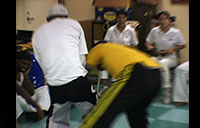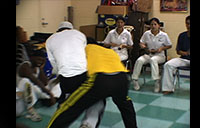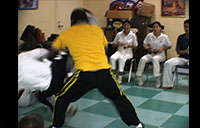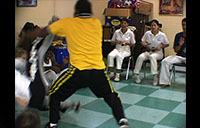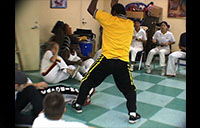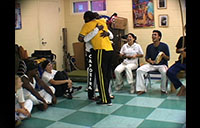A bit about Capoiera Angola
Capoeira originated in the Bantu region of Africa and to have been transported to Brasil during the slave trade. In a capoeira game, two players use a combination of stealth acrobatic and martial arts movements to maneuver one another into a defenseless position. Capoeira games takes place inside a circular area called a "roda" (or circle in Portuguese) formed by the Capoeira players and onlookers. "Roda" is also the word used to describe the party or event in which several Capoeira games are played striking an opponent directly or deliberately is frowned upon in a Capoeira game. Rather, the object of the game is to simply striking movements and to avoid them gracefully.
The speed of your game (Credit to writer of Capoeira Angola Blog)
http://angoleiro.wordpress.com/">Click here for LinkMost people do know that Capoeira Angola is generally played in a slower pace than Capoeira Regional. In fact, some people think that Capoeira Angola is just the slower version of Capoeira Regional. I wont go into that one, because most of the fans and players of Capoeira know that it's not right anyway. Some people also know that Capoeira Angola games are highly variable in terms of speed. A game can switch from slow to fast to slow in less than ten seconds. That Capoeira Angola is always slow is a common misunderstanding which usually leads to some unpleasant surprises. But, and that's what this post is about, it is still an important attribute.Why?
There is many different reasons why Capoeira Angola is played in a slow base rhythm. I will just count the most common (and obvious) of these:Endurance: As a typical game in Capoeira Angola goes into the minutes and can easily go on for more than 10 minutes a high pace is not recommendable. In comparison, games in some Regional rodas are incredibly short, sometimes it's a matter of a few seconds until you get bought out. This short times pan forces you to get into a game as fast as possible. If a game in a Regional roda would take 10 minutes retaining its speed, most people would drop unconscious
Safety:
A Roda is not always a safe place. In Capoeira Angola your space is petty limited. It is almost impossible to be not enangered when a person in a two-meter-diameter-roda does make a fast kick. For the safety of you and your partner it is recommendable to slow down the game, even if it gets faster in between. And even if you don't care much about the other person you are playing with the rule applies "what goes around, comes around". Play fast and you will get a fast response. Thus, it is sometimes just smarter to play at a slower pace.
Aesthetics:
Players of Capoeira do regularly state that Capoeira Angola is much more expressive and playful than Regional or Contemporary Capoeira. This would not be possible in a high speed game. The higher the speed of the game the more people (especially beginners and not-so-advanced players) concentrate on not getting hit, hitting the other person and maybe even performing a good game. And the first things dropped would be the playfulness and the individual expressions you can do in a roda. Thus, a too fast game which keeps on staying too fast is often seen as an "ugly game" Angola roda, more because of the lack of grace and mandinga than because of the speed.
Precision:
Here I will quote my first teacher. During training he liked to tell us "I have you rather doing the movements 3 times right than 30 times wrong". He used to say this when the students sped up in training and started being sloppy with the movements. This does easily apply to a game. The faster a game is the less time you have for precise movements, the sloppier you get. That can lead to accidents involving you and/or your partner. Or, it can just lead to the movements looking short, un complete, ugly. Having time during the game does give you the chance to do your movements right, precise and with grace.
Health:
It is indeed healthier to play slow than to play a fast paced game. This does count for the individual game as well as on the long term. Why? The faster the game the higher is the danger that you don't listen exactly what your body tells you. An Au you might go into might be started wrong and risking your back or your limbs. In a fast game the chance to correct this fault is lower than in a slow game. For example: in an Angola game which was a tad too fast a friend of mine did almost cripple himself doing an Au malandro (I think some people call it an Au batido). He had so much speed that his upper arm moved forwards while his hand was planted and his upper body falling backwards – to make it short: for a split of a second his elbow was on the wrong side of the arm… In terms of long term effects of fast playing wearing off of knees and wrists is one of the most prominent Capoeira illnesses. Jumps and rapid stressing these vulnerable body parts do have a bad effect in long term (although: I am talking here out of a mixture of experience and pure logics. I have no statistical or medical data for this. But it would be interesting if somebody would investigate this!).
